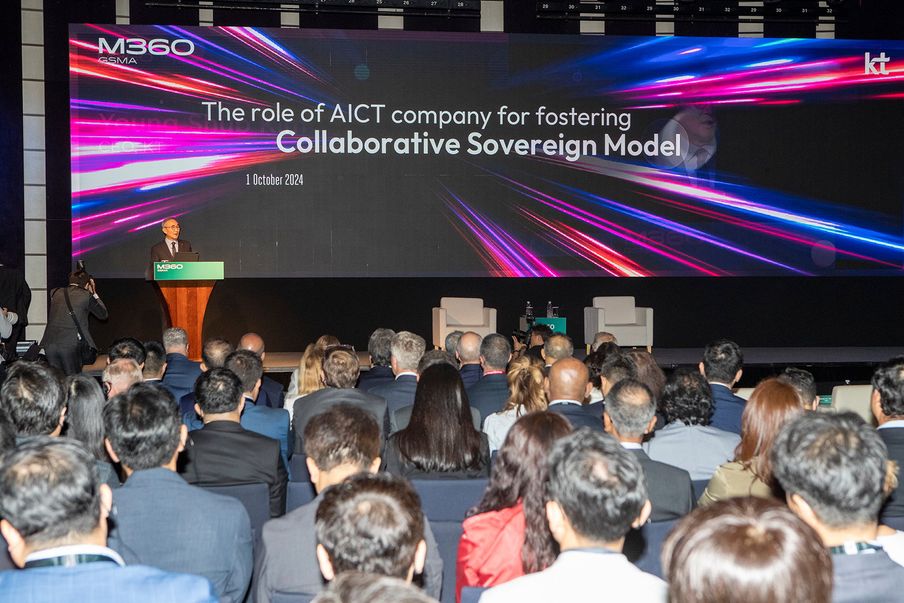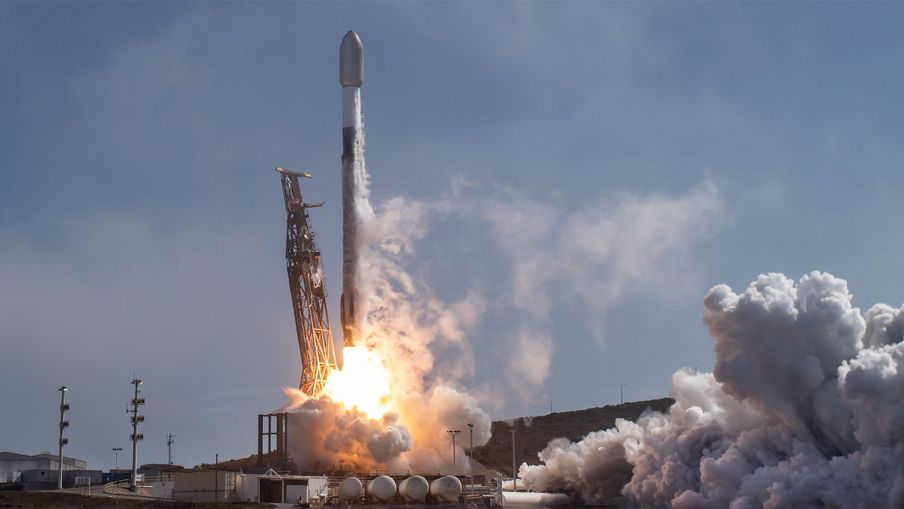AI Revolution Spurs Fivefold Data Demand Increase by 2030

[M360 APAC in Seoul] AI transformation
KT CEO Advocates for Collaborative Sovereign AI Strategy
AI and Telecom Synergy Set to Propel Data Demand
KT’s CEO Advocates ‘Cooperative Sovereign AI’ Amid Global Race for Generative AI Dominance
As countries and corporations worldwide increasingly adopt the concept of 'sovereign AI,' emphasizing the development of independent AI capabilities using proprietary data and infrastructure, KT Corporation has introduced a new strategic approach.
Kim Young-seop, CEO of KT, highlighted the importance of collaboration in AI development during his keynote address at the GSMA’s M360 APAC event, held at the Westin Chosun Hotel in Seoul.
Kim proposed a 'Cooperative sovereign AI' model, suggesting that the global pursuit of supremacy in generative AI, which demands colossal investments, is not a task any one country or company can tackle alone.
“No single entity can independently possess cutting-edge technologies such as AI, autonomous driving, and humanoid robotics efficiently, given the high opportunity costs and time required,” Kim explained.
The cooperative approach encourages companies to retain sovereignty over their data and AI technologies while drawing from a broader spectrum of global technologies, minimizing reliance on any single platform or technology provider.
In a move reflecting this vision, KT has forged a strategic partnership with Microsoft (MSFT), aimed at developing Korean AI models and cloud services to accelerate AI transformation across industries.
The collaboration seeks to leverage Microsoft’s expertise in AI, specifically OpenAI’s multimodal GPT-4o model and its small language model, Phi, to create AI solutions tailored to Korean businesses and culture.
This partnership is set to revolutionize the deployment of AI across various sectors, with an initial focus on enhancing KT’s customer service chatbots and offering industry-specific solutions to their B2B clients.
The initiative underlines KT’s ambition to play a pivotal role in Korea’s AI landscape while leveraging global AI advancements to drive growth.
In a video message at the event, Microsoft CEO Satya Nadella emphasized the transformative potential of AI. He said “AI will fundamentally change productivity across all sectors, including telecommunications. We are excited to build a robust AI and cloud ecosystem, combining KT’s local expertise with Microsoft’s advanced technology”
KT’s cooperative sovereign AI model underscores a broader shift in the AI industry, where collaboration and strategic alliances may be key to keeping pace with the rapid advancements in technology while safeguarding data sovereignty and national interests.

The integration of AI and telecommunications is driving rapid, innovative changes. Beyond the digital transformation of communication networks, we aim to deliver value to customers through advanced technological personalization and real-time decision-making automation systems.KT CEO Kim Young-seop
KT CEO Highlights Telecom’s Pivotal Role in the AI Revolution
KT Corporation’s CEO, Kim Young-seop, underscored the growing importance of telecommunication operators in the emerging era of generative AI, emphasizing that these companies must evolve into AI-driven service providers.
In his remarks, Kim highlighted the need for telecoms to move beyond their traditional roles and integrate AI capabilities across a broader range of services.
“The integration of AI into our everyday lives is no longer a futuristic vision—it’s happening now,” Kim stated.
He stressed that telecom providers are no longer just network facilitators; instead, they are poised to lead the shift toward AI-powered services. This shift, he noted, is already visible in sectors like healthcare, where AI-enabled telemedicine and video diagnostic services are gaining momentum, and transportation, where intelligent systems powered by AI video analytics are enhancing operational efficiency.
Kim further emphasized that the advancement of telecom networks is crucial for supporting AI applications in industries like autonomous vehicles and robotics. “AI-based services such as self-driving cars and unmanned factories require communication networks capable of ultra-broadband speeds and ultra-low latency to fully operate,” he noted, calling on telecoms to remain at the forefront of developing next-generation networks like 6G.
Kim’s comments reflect KT’s broader vision to position itself as a key player in the AI ecosystem, leveraging its telecom expertise to build infrastructure that supports the seamless integration of AI across industries.
His call for telecom operators to lead in the deployment of AI services also speaks to the growing convergence between telecommunications and advanced AI applications, making telecoms a pivotal force in the tech industry’s next wave of innovation.
This forward-looking strategy highlights the ongoing transformation of telecom companies into AI service providers and underscores the role they will play in shaping the digital future.

Samsung Network Division Chief Envisions Data-Centric Network to Harness AI's Full Potential
Samsung Electronics is doubling down on the role of network infrastructure as the backbone for the next generation of artificial intelligence (AI).
In a recent address, Kim Woo-jun, President of Samsung's Network Division, laid out the company's vision for a "data-centric network infrastructure" emphasizing its critical importance for unlocking the transformative power of AI.
During his presentation, Kim likened AI’s disruptive potential to pivotal moments in history such as the Industrial Revolution and the invention of electricity. "AI will bring about economic changes similar to the Industrial Revolution or the introduction of electricity," he remarked, pointing to the need for fundamental shifts in organizational structures and processes to leverage AI's capabilities fully. These changes, he suggested, will not only improve productivity but will redefine entire industries.
Central to this vision is the evolution of network infrastructure. Kim stressed that a modern, optimized network must efficiently collect, process, and leverage vast amounts of data to enable AI applications to operate at scale.
The development of data-centric networks, he said, would be "the foundation for realizing the practical value of AI."
In addition, Kim highlighted the need for open infrastructures, particularly end-to-end software-defined networks (SDNs), which offer flexibility and scalability crucial for AI's integration across diverse sectors. "Generative AI is not merely a tool," he stated, "but a core driver of innovation across all industries."
Kim concluded his remarks by underlining the importance of next-generation communication networks.
As AI continues to advance, communication infrastructures like cloud and edge computing will provide companies with the tools needed to create truly differentiated value, enabling them to harness AI's full potential.
Samsung’s commitment to developing robust AI infrastructure reflects its broader strategy of positioning itself at the forefront of digital transformation, helping to lead industries into the AI-driven future.

AI and Telecom Synergy Set to Propel Data Demand, GSMA Chief Predicts
Mats Granryd, Secretary-General of the GSMA, delivered a compelling keynote speech during the M360 APAC event, forecasting a seismic shift in mobile data demand fueled by the rapid evolution of artificial intelligence (AI).
Granryd argued that the fusion of AI technologies with telecommunication services will unlock new business opportunities for global telecom operators, while also putting significant strain on data infrastructure.
Granryd spotlighted South Korea as a leader in the AI landscape, noting the country’s significant government investments and advances in technology.
These factors, he predicted, would contribute to a fivefold increase in data consumption across the Asia-Pacific region by 2030. "Korea is leading the way in AI," Granryd stated, predicting that the region's rapid technological growth would drive unprecedented data usage.
However, Granryd tempered his optimism with a sobering reality check: despite soaring data consumption, telecom operators are grappling with stagnant revenues.
This revenue stagnation poses a serious challenge to the industry, which requires massive infrastructure investments to meet the surging demand. Granryd emphasized that telecom operators cannot face this challenge alone and called for stronger collaboration with policymakers and governments. "To foster continued growth and support additional investments, it's essential that the regulatory environment is conducive to innovation and network expansion," he said.
Granryd further highlighted the role of the 'Open Gateway' initiative, a collaborative effort aimed at reducing the investment burden on telecom operators while simultaneously advancing network capabilities. He pointed to South Korea’s major telecom companies—KT, SK Telecom, and LG Uplus—as pioneers in adopting this protocol, which could lead to new application programming interfaces (APIs) and potentially create a $30 billion market opportunity.
In his closing remarks, Granryd reiterated that while AI presents transformative opportunities for the telecom sector, success will hinge on strategic collaboration between industry players and regulatory bodies, ensuring that the infrastructure can keep pace with the explosive demand for data.
The 'M360 APAC' event, hosted by the GSMA was held in Korea for the second consecutive year, with The Miilk participating as a media sponsor for the second year in a row.









